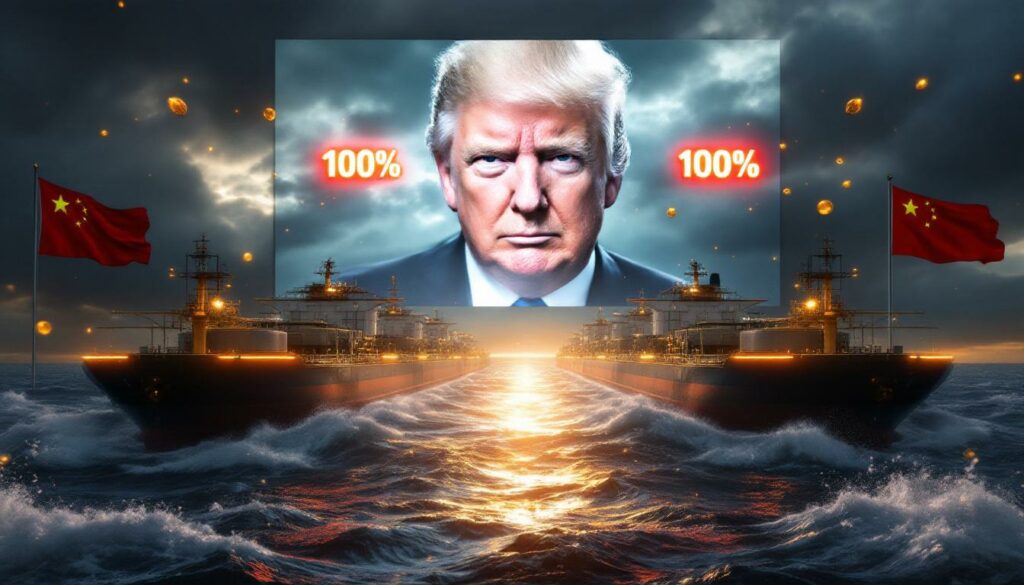Trump's Tariff Threats: Implications for China-Russia Oil Trade
As geopolitical tensions escalate, former President Trump's tariff threats targeting countries that continue trading with Russia have sent shockwaves through global energy markets. With a specific focus on China's substantial Russian oil imports, these developments could reshape international trade patterns and diplomatic relations for years to come.
How Are Trump's Tariff Threats Targeting Russian Oil Purchases?
Trump has threatened to impose sweeping secondary sanctions on countries maintaining trade relationships with Russia, particularly targeting major oil importers. According to the South China Morning Post (August 5, 2025), a firm deadline of August 7-9, 2025, has been established for countries to curtail their Russian trade or face punitive measures.
The Escalating Pressure Campaign
The proposed sanctions include potential 100% secondary US economy tariffs on countries continuing to import Russian goods if Russia fails to engage in Ukraine ceasefire negotiations. This aggressive stance represents a significant escalation in economic pressure tactics.
Matt Gertken, chief geopolitical strategist at BCA Research in Canada, told the South China Morning Post: "The US said at the time that it would implement those [tariff] threats by August 7-9 if trade with Russia was not curtailed by then, and affirmed that China would be a target. The US has already taken action on India, so China is next in line."
This approach signals a strategic pivot toward using economic leverage to influence international relations around the Ukraine conflict, which has now continued for approximately three and a half years as of August 2025.
Current Sanctions Landscape
The United States and European Union have already implemented extensive sanctions against Russia following its military actions in Ukraine. These new secondary sanctions represent an expansion of that strategy, designed to target countries helping Russia circumvent existing restrictions.
The secondary sanctions framework aims to systematically cut off Russia's remaining economic lifelines amid the ongoing US-China trade war. By targeting major trading partners like China and India, this approach seeks to isolate Russia further from global markets.
India has already faced consequences for its Russian oil purchases, establishing a precedent that makes the threats against China more credible. This pattern of enforcement suggests a coordinated campaign rather than isolated incidents.
Why Is China's Russian Oil Trade Under Scrutiny?
China's energy relationship with Russia has become increasingly strategic for both nations in recent years, making it a natural target for economic pressure tactics aimed at isolating Russia.
Strategic Energy Partnership
Russia has emerged as China's top source of crude oil imports, supplying a record high 108.5 million tonnes in 2024, according to data reported by the South China Morning Post. This volume represents 19.6% of China's total crude imports, underscoring the significance of this trading relationship.
The energy partnership has intensified following Western sanctions on Russia, as China capitalized on favorable pricing and terms while Russia sought alternative markets for its energy exports. This mutually beneficial arrangement has helped Russia maintain crucial revenue streams despite international isolation.
China has leveraged this relationship to secure a reliable energy supplier with advantageous terms, bolstering its energy security while maintaining political alignment with Moscow on various international issues.
Geopolitical Significance
The oil trade forms a cornerstone of the broader China-Russia strategic alignment that has developed over the past decade. Energy cooperation transcends purely commercial interests, representing a tangible manifestation of their diplomatic and strategic relationship.
For Russia, Chinese energy purchases provide a crucial economic lifeline amid Western isolation, helping to fund government operations and stabilize the economy despite extensive sanctions. For China, the relationship ensures energy security through diversified supply sources and reduced vulnerability to maritime supply disruptions.
This energy nexus has become increasingly important in the evolving multipolar world order, where both nations have sought to counterbalance Western influence through strategic cooperation on trade, security, and diplomacy.
How Might China Respond to Trump's Tariff Threats?
China faces difficult choices in responding to these tariff threats, balancing energy security needs against potential economic consequences.
Official Chinese Position
China's government has already signaled its approach through diplomatic channels. Guo Jiakun, spokesman for China's Ministry of Foreign Affairs, emphasized that "China will take energy supply measures… based on national interests" and stated firmly that "tariff wars have no winners" (South China Morning Post, August 5, 2025).
This positioning suggests China will frame any response as defending its economic sovereignty rather than supporting Russia specifically. Beijing consistently maintains that unilateral sanctions and economic coercion violate international norms and undermine global economic stability.
China may leverage international forums such as the United Nations, G20, or BRICS to challenge the legitimacy of secondary sanctions and build a coalition of nations opposed to such measures.
Strategic Options Analysis
China has several potential responses available, each with different implications for global markets and geopolitical relationships:
-
Continue current import levels while developing alternative payment mechanisms that reduce exposure to the dollar-based financial system
-
Partially reduce import volumes to signal flexibility while maintaining the core supply relationship
-
Explore diplomatic channels to negotiate exemptions or modifications to the tariff threats based on strategic interests
-
Implement countermeasures against US interests if tariffs materialize, potentially targeting agricultural imports, commercial relationships, or cooperation on other global issues
The most likely outcome involves a combination of these approaches, with China making symbolic concessions while protecting its core energy relationship with Russia.
What Makes China Unlikely to Stop Russian Oil Purchases?
Several fundamental factors suggest China will maintain significant Russian oil imports despite external pressure.
Energy Security Imperatives
China's strategic goals require a stable and secure supply of critical resources such as oil. As Matt Gertken of BCA Research noted, analysts "expect that China 'will not stop' buying oil from its northern neighbour, given their mutually beneficial relationship of energy cooperation" (South China Morning Post, August 5, 2025).
The diversification of energy sources remains a national priority for Beijing, particularly as domestic production proves insufficient to meet growing demand. Chinese policymakers view energy security as non-negotiable, making compliance with external demands to restrict supply sources politically difficult.
Russian pipeline infrastructure provides China with a reliable land-based supply route that reduces vulnerability to maritime chokepoints and potential naval blockades in conflict scenarios. This strategic advantage is difficult to replicate with alternative suppliers.
Economic Considerations
Beyond strategic concerns, practical economic factors also influence China's decision-making:
-
Price advantages: Russian oil has frequently been available at discounted rates compared to global benchmarks following Western sanctions
-
Established logistics: Years of investment in pipeline infrastructure, shipping routes, and refinery compatibility create significant switching costs
-
Replacement challenges: Finding alternative suppliers capable of delivering nearly 20% of China's crude imports would create substantial market disruption
-
Preferential terms: Russia's limited buyer options have led to favorable financing arrangements and contract structures that benefit Chinese importers
These factors combine to create powerful economic incentives for maintaining the trading relationship despite external pressure.
How Would Tariffs Impact Global Oil Markets?
If implemented, the threatened tariffs could trigger significant disruptions across global energy markets.
Market Disruption Scenarios
The potential redirection of global oil flows represents one of the most immediate market impacts if China reduces Russian imports. This would create cascading effects across supply chains and pricing mechanisms:
-
Reshuffling trade patterns: Russian oil might be redirected to other buyers like India or Turkey, while China would seek replacement volumes from the Middle East, Africa, or Latin America
-
Price volatility: Markets would likely experience significant turbulence during adjustment periods as traders reassess supply-demand balances
-
Regional price disparities: Different crude grades and geographic regions could see diverging price trends as trade flows reorganize
-
Risk premiums: Uncertainty about policy enforcement and potential escalation could add risk premiums to various crude benchmarks
These market disruptions would likely persist until new equilibrium trading patterns emerge, potentially taking months or years to fully stabilize.
Alternative Supplier Outlook
If China were forced to reduce Russian imports, several alternative suppliers might compete to fill the resulting supply gap:
-
Middle Eastern producers: Saudi Arabia, UAE, and Iraq have capacity to increase exports to China, though potentially at higher prices
-
US exporters: American producers could expand market share in China if political tensions permit, leveraging growing export capacity
-
African suppliers: Nigeria, Angola, and Libya represent potential alternative sources, though with higher logistical complexity
-
South American options: Brazil and Guyana's growing production could partially offset Russian volumes
The resulting competition would likely benefit producers while potentially raising costs for Chinese refiners and consumers.
What Are the Broader Geopolitical Implications?
The conflict over China's Russian oil purchases reflects deeper shifts in the global order and international relations.
US-China Relations
These tariff threats represent another flashpoint in an increasingly complex and often adversarial US-China relationship. Economic coercion has become a common diplomatic tool in this relationship, with energy security now emerging as a key area of strategic competition.
The targeting of China's energy supplies signals a willingness to leverage economic interdependence for strategic advantage, potentially accelerating efforts to reduce mutual vulnerabilities through "decoupling" in critical sectors.
If tariffs are implemented and countermeasures follow, the potential for escalating economic conflict between the world's largest economies creates significant global risks beyond the energy sector.
Global Alliance Dynamics
This situation serves as a critical test of the China-Russia "no limits" partnership under external pressure. The depth and resilience of this relationship will be revealed by how both nations navigate these challenges.
Western alliance cohesion on Russia sanctions policy also faces examination, particularly if European nations prove reluctant to follow the US lead on secondary sanctions that might disrupt their own economic interests.
The situation accelerates the potential emergence of alternative economic blocs and payment systems designed to reduce vulnerability to Western financial pressure. This could include expanded use of national currencies in bilateral trade and development of alternative financial messaging systems.
For international institutions and global governance frameworks, these developments raise fundamental questions about the future of rules-based trade and the appropriate limits of sanctions as policy tools.
FAQ: Understanding Trump's Oil Tariff Threats
What exactly has Trump threatened regarding Russian oil trade?
Trump has threatened to impose 100% secondary tariffs on countries that continue to import Russian goods, specifically targeting major buyers like China if they don't curtail trade by the early August 2025 deadline. These measures aim to pressure Russia indirectly by targeting its key trade partners.
How dependent is China on Russian oil?
China relies heavily on Russian oil, which constitutes nearly 20% of its total crude imports. In 2024, China imported a record 108.5 million tonnes of Russian crude, making Russia its largest oil supplier, according to data reported by the South China Morning Post (August 5, 2025).
Has the US implemented similar tariffs before?
Yes, the US has already taken action against India for its Russian oil purchases, establishing a precedent for the enforcement of these secondary sanctions against major economies. This prior enforcement makes the threats against China more credible and demonstrates a willingness to implement such measures despite economic consequences.
What alternatives does China have for oil imports?
China could potentially increase imports from Middle Eastern producers, African nations, or other suppliers, but replacing nearly 20% of its crude imports would present significant logistical and economic challenges. The established infrastructure, pricing arrangements, and strategic value of Russian supplies make finding equivalent alternatives particularly difficult.
Navigating Energy Security Amid Geopolitical Tensions
The confrontation over China's Russian oil purchases highlights the complex intersection of energy security, geopolitical alignment, and economic coercion in international relations. As Trump's tariff deadline approaches, China faces difficult choices balancing its strategic partnership with Russia against potential economic consequences from the United States.
China's response will likely involve a combination of diplomatic resistance, partial concessions, and development of alternative financial mechanisms rather than complete abandonment of Russian oil imports. This middle path reflects China's pragmatic approach to international challenges and its prioritization of energy security over external demands.
For global energy markets, the outcome of this confrontation will influence trade flows, pricing dynamics, and investment decisions across the oil market trade impacts. Producers, traders, and consumers worldwide will need to adapt to the resulting changes in supply patterns and market structures.
The broader geopolitical landscape will also be shaped by how this situation unfolds, potentially accelerating the fragmentation of global trade into competing blocs with different rules, norms, and alignment. This process of economic realignment represents one of the defining features of the emerging multipolar world order.
Disclaimer: This article contains analysis of potential future events and market impacts that are inherently speculative. Readers should consult multiple sources and professional advisors before making investment or business decisions based on these assessments.
The tariffs impact on investments will likely be substantial across various asset classes, while changes in OPEC production impact could further complicate the global energy landscape as market participants navigate these unprecedented tariff threats on Russian oil purchases and China.
Looking for the Next Major Mining Discovery?
Discover significant ASX mineral discoveries instantly with Discovery Alert's proprietary Discovery IQ model, which transforms complex data into actionable investment insights. Visit the Discovery Alert discoveries page to understand how major mineral discoveries have historically generated substantial market returns and begin your 30-day free trial today.




